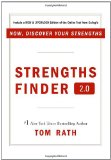 I’m taking a leadership course at work just now, and one of the exercises was to take the StrengthsFinder (Amazon) test.
I’m taking a leadership course at work just now, and one of the exercises was to take the StrengthsFinder (Amazon) test.
At first I took the test and thought it was a bit rubbish. I didn’t really have strong preferences for a lot of things (much of which came from me being very ambivert) and so my summaries were as a result full of not very definite statements “on occasion, it’s possible that you…”
I also didn’t really like my strengths – I got Input, and Learner, but they seemed to be the same thing, so why have that twice? And Significance, which is all about needing to be liked, which made me not like myself very much. And then Arranger and Individualization.
I’ve been reading the StrengthsFinder book, though, and I’ve come round to things more. Reading the general summaries has been more helpful, because it’s less fuzzy. Also, seeing other things I’m definitely not has made what it identified me as being make more sense. I’ve also been picking out strengths that I think particular colleagues have, which makes it easier to relate to them.
In the course, we were talking about how we thought our strengths helped us do our job. One of the things I found interesting about mine, was how I have two pairs that enable me to do different things. So Learner/Input are about engineering, and Arranger/Individualization are about organizing things and other people (like GGD, or AF).
At the first session of the course, I wondered whether I read so many personal development books that I wouldn’t get much out of it – like, it was a course for people who didn’t do that. But taking the StrengthsFinder test and subsequent discussions made me revisit that thought. Now I wonder if I can get the rest of my team to take it as well…

2 replies on “Strengthsfinder 2.0”
Hey Cate,
What’s going on? What’s a coincidence, I bought the book 5 days ago and I took the test yesterday.
It is a whole new thinking that I’ve been having after fast reading Stephen M.R. Covey’s book “the speed of trust” : Invest less energy in focusing on the weaknesses and embrace and cultivate your strengths. And I adore that proposition.
Then I took the test, I appreciated the whole and the strengths are pretty ok when I read more about them (Input/Developer/Ideation/Learner/Intellection).Â
But I was really frustrated:Â
– first, just to have 5 strengths and not to have the possibility to know how I scored on the 34.Â
– second, it is really static. These strengths need to be crossed, connected and I was so frustrated that if you want to know more you have to pay for it. No big deal, I’ll figure out myself, and some connections are evident.
– third, it was too quick and the test doesn’t give the opportunity to come back to some answers and there was no mention about standard deviation, margin error. It wasn’t really clear.
-fourth, the access code is for one use only and it is not ok for me. It must be possible to share it with 2 or 3 friends. bummer!
– fifth (this point is less important) the test presumes that we’re ok with ourselves, like we cannot underestimate the way we evaluate ourselves, for example if the test-taker is in bad mood, lacks confidence etc. Ok, ok maybe that’s a different problem.
To conclude, it’s worth knowing those things, it gives new perspectives, new ways to achieve goals and sometimes in my case, accept a great part of who I am and embrace it
And I think it is something people need to do more, focus on their strengths… And update their evolution periodically.
By the way, I think Input and Learner are not the same. The “Input” person want to learn in order to gather information to output one day. The “Learner” focus more on the process of learning. But sure those themes are really connected.
I hope you are doing well. See you at GHC 2012. This time, I’ll be there.
You can tell you are a techie with the desire for more data! I get what you mean, it’s always such broad strokes and I feel too, like “how do they know?” “what’s the certainty?” – especially for conclusions that I don’t really like ;)Â
Nice explanation of the distinction between input and learner, too. Was curious to discover colleagues who had one without the other.